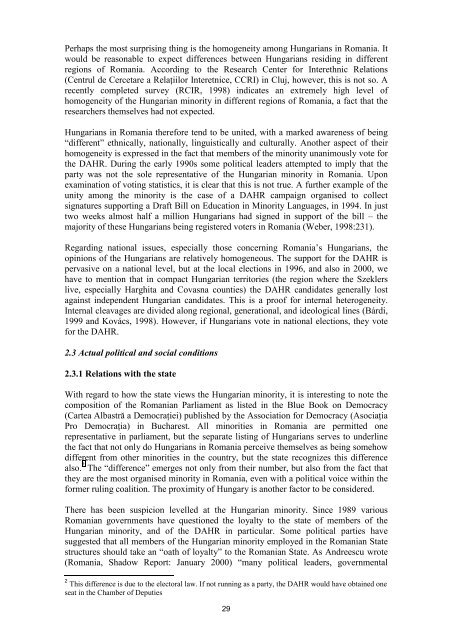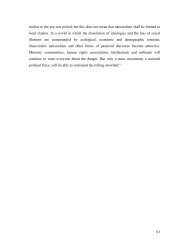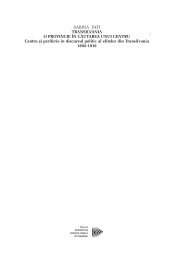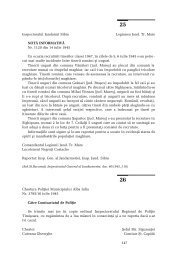Southeast Europe
Southeast Europe
Southeast Europe
Create successful ePaper yourself
Turn your PDF publications into a flip-book with our unique Google optimized e-Paper software.
Perhaps the most surprising thing is the homogeneity among Hungarians in Romania. It<br />
would be reasonable to expect differences between Hungarians residing in different<br />
regions of Romania. According to the Research Center for Interethnic Relations<br />
(Centrul de Cercetare a Relaţiilor Interetnice, CCRI) in Cluj, however, this is not so. A<br />
recently completed survey (RCIR, 1998) indicates an extremely high level of<br />
homogeneity of the Hungarian minority in different regions of Romania, a fact that the<br />
researchers themselves had not expected.<br />
Hungarians in Romania therefore tend to be united, with a marked awareness of being<br />
“different” ethnically, nationally, linguistically and culturally. Another aspect of their<br />
homogeneity is expressed in the fact that members of the minority unanimously vote for<br />
the DAHR. During the early 1990s some political leaders attempted to imply that the<br />
party was not the sole representative of the Hungarian minority in Romania. Upon<br />
examination of voting statistics, it is clear that this is not true. A further example of the<br />
unity among the minority is the case of a DAHR campaign organised to collect<br />
signatures supporting a Draft Bill on Education in Minority Languages, in 1994. In just<br />
two weeks almost half a million Hungarians had signed in support of the bill – the<br />
majority of these Hungarians being registered voters in Romania (Weber, 1998:231).<br />
Regarding national issues, especially those concerning Romania’s Hungarians, the<br />
opinions of the Hungarians are relatively homogeneous. The support for the DAHR is<br />
pervasive on a national level, but at the local elections in 1996, and also in 2000, we<br />
have to mention that in compact Hungarian territories (the region where the Szeklers<br />
live, especially Harghita and Covasna counties) the DAHR candidates generally lost<br />
against independent Hungarian candidates. This is a proof for internal heterogeneity.<br />
Internal cleavages are divided along regional, generational, and ideological lines (Bárdi,<br />
1999 and Kovács, 1998). However, if Hungarians vote in national elections, they vote<br />
for the DAHR.<br />
2.3 Actual political and social conditions<br />
2.3.1 Relations with the state<br />
With regard to how the state views the Hungarian minority, it is interesting to note the<br />
composition of the Romanian Parliament as listed in the Blue Book on Democracy<br />
(Cartea Albastră a Democraţiei) published by the Association for Democracy (Asociaţia<br />
Pro Democraţia) in Bucharest. All minorities in Romania are permitted one<br />
representative in parliament, but the separate listing of Hungarians serves to underline<br />
the fact that not only do Hungarians in Romania perceive themselves as being somehow<br />
different from other minorities in the country, but the state recognizes this difference<br />
also. 2 The “difference” emerges not only from their number, but also from the fact that<br />
they are the most organised minority in Romania, even with a political voice within the<br />
former ruling coalition. The proximity of Hungary is another factor to be considered.<br />
There has been suspicion levelled at the Hungarian minority. Since 1989 various<br />
Romanian governments have questioned the loyalty to the state of members of the<br />
Hungarian minority, and of the DAHR in particular. Some political parties have<br />
suggested that all members of the Hungarian minority employed in the Romanian State<br />
structures should take an “oath of loyalty” to the Romanian State. As Andreescu wrote<br />
(Romania, Shadow Report: January 2000) “many political leaders, governmental<br />
2<br />
This difference is due to the electoral law. If not running as a party, the DAHR would have obtained one<br />
seat in the Chamber of Deputies<br />
29









